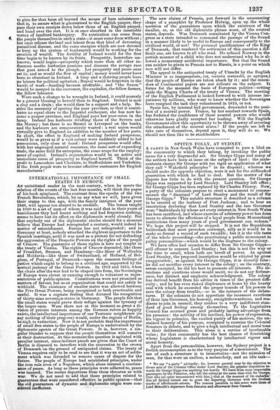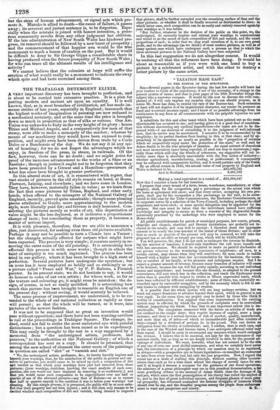SPITE'S FOLLY, AT SYDNEY.
A PA.RTY in New South Wales have conspired to pass a libel on the community to which they belong, by invoking the public name for a very disgraceful act. Sir George Gipps and many of the settlers have been at issue on the subject of land : the male- contents charge Sir George with too rigid an application of what they call " Wakefield principles" in its disposal ; whereas we should make the opposite objection, were it not for the stiffnecked generation with which he had to deal. But the matter of the dispute has little to do with the present question. Sir George Gipps was supported by Lord Stanley. Lord Stanley left office ; Sir George Gipps has been replaced by Sir Charles Fitzroy. Now, a party of the colonists propose to erect a monument to comme- morate the "dismissal" of Lord Stanley and the recall of Sir George Gipps.* This notable structure is described as a column to be erected at the harbour of Port Jackson ; and to bear an inscription declaring that Lord Stanley and the late Governor were "individuals by whose act every interest in New South Wales has been sacrificed, and whose exercise of arbitrary power has done more to alienate the affections of a loyal people from Monarchical institutions than many years of good government can redeem." We hope this project will be stopped. It is not the Republican balderdash that most provokes contempt, silly as it would be to make so formal a record of such twaddle; but it is the vile taste of the whole proceeding—the prostituting a public monument to paltry personalities—which would be the disgrace to the colony. We have often had occasion to differ from Sir George Gipps- still oftener to censure Lord Stanley ; but this is not the way or the time to assail, when both are bereft of power. As against Lord Stanley, the proposed inscription would be vitiated by gross exaggeration ; as against Sir George Gipps, it is directly false : he did not sacrifice every interest in the colony.; on the contrary, errors excepted, he did his best to promote all interests. His in- tentions and exertions alone would merit, we do not say forbear- ance, but distinct and emphatic acknowledgment. The colony has derived benefit from his advice in times of the greatest diffi- culty; and he has even risked displeasure at home by the hearty zeal with which he exceeded the proper bounds of his powers to save the colony from trouble,—as in the instance of the deben- tures. If the colonists do not appretiate the incessant exertions of their late Governor, his honesty, straightforwardness, and rea- diness to join in council, they confess to a very indifferent stan- dard of good feeling among themselves. To the Legislative Council has accrued great and probably lasting advantage from his presence : the activity of his intellect, his power of expression, his vigour in polemics, the exalted purity of his motives, the un- stained honesty of his purpose, conspired to exercise the Colonial Senators in debate, and to give a high intellectual and moral tone to their deliberations. This alone is a service of inestimable value ; for that community has the best chance of flourishing whose Legislature is characterized by intellectual vigour
moral honesty.
Apart from the personalities, however, the Sydney project is a foolish misconception as to the very purpose of a monument. The use of such a structure is to immortalize—not the mistakes of man, for that were an endless, a melancholy, and an idle task— We say "a party" advisedly; for, however general may be the objection to divers acts of the Colonial Office under Lord Stanley, the popular disposition to- wards Sir George Gipps was anything but hostile We learn from most respectable passengers by the Palestine, who left the colonfat the same time with Sir George, (but who are quite unconnected with him,) that at the moment of his embarka- tion all Sydney turned oat to greet the departing Governor with the liveliest marks of affectionate esteem. The nearest parallels to this scene were theme of Lord Metcalfe's departure from Jamaica and afterwards from Canada.
but the steps of human advancement, or signal acts which pro- mote it. Mistake is allied to death—the cause of failure, it passes sway; its severest and justest sentence is, to be forgotten. Espe- cially when the mistake is joined with honest intention, a gene- rous community revolts from any other judgment but oblivion. If the late administration of New South Wales has hindered pro- gress, its removal should be followed by a new burst of prosperity ; and the commencement of that happier Eera would be the true monument to teach a lesson of caution on the past. But it would be difficult to deny to Sir George Gipps a considerable share in having produced even the future prosperity of New South Wales ; for who can trace all the ultimate results of his intelligence and activity We cannot believe that the colonists at large will suffer the erection of what would really be a monument to indicate the sway which spite and bad taste exercised among them.































 Previous page
Previous page